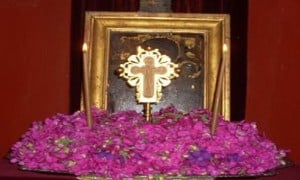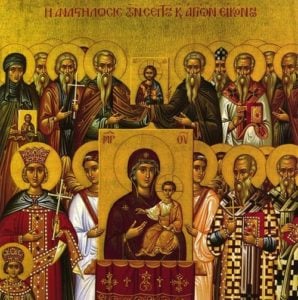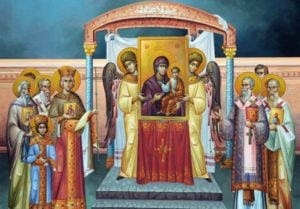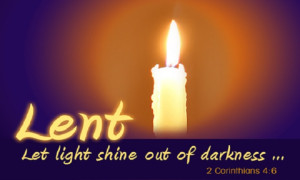Penthos: The Lenten Journey to Joy
17 February 2017O Lamb of God,
Who take away the sins of all,
Take from me the heavy yoke of sin,
And in Your compassion
Grant me tears of compunction.
From the Great Canon of Saint Andrew of Crete
Some of us might think: here we go again, another Lent is on us, and many weeks without our favorite eggs and bacon, all that we like and just can’t live without
Today, I would like to propose you a more dynamic and positive outlook on Lent. Great Lent is actually an adventure, a fabulous journey. All of us Orthodox Christians are together on this journey, and we have a great companion: the Prodigal Son (Lk 15:11-31).
You heard this parable during the Divine Liturgy a few weeks ago. It speaks volumes on the love of the Father, so much so that some people don’t call it the prodigal son, but the prodigal father!
It also teaches us about ourselves. As the story begins, we know that the prodigal son is none other than our own selves, with our sinfulness and rebellion. During Matins, we pray:
“The divine treasure that once you gave me, Father, I have sinfully wasted. I have departed from You and lived as the Prodigal, O Compassionate Father… But now I return to You and cry with tears: I fall down before Your loving-kindness, accept me now also as I return”.
“The divine treasure that once you gave me…”: with the Prodigal, we acknowledge the goodness of the Father, and we are aware of all the wealth He has given us: our lives, the beauty of nature, our families and friends, and His Salvation.
If we are honest with ourselves, we also have to admit the waste we have made of these treasures. The prodigal son went to a far country, and there spent all that he had. A far country: it is the unique definition of our human condition that we must assume and make ours as we begin our journey. We constantly turn and depart from our Father, we run away from the source of His goodness as if we had somewhere more important to go.
Far from our Father, far from our true Home, we are in exile. There, we are enslaved and we suffer. We are enslaved to a multiplicity of needs, many being roused in us by our consumerism society (just as the prodigal wanted to consume the husks of the pigs). We are torn between all these needs, which keep us at the superficial level, and we suffer, because deep under these needs, we feel the hunger for the only important thing:
“I am wasted with hunger… and in exile from Your presence, O Christ supreme in loving-kindness. Take pity on me as I now return, and save me as I sing the praises of Your love for mankind”.
In exile, enslaved and in pain, we cry with tears, with the prodigal and with the psalmist: “By the rivers of Babylon we sat and wept at the memory of Zion…On the poplars there we had hung up our harps… How could we sing a song on alien soil?” This Psalm 136 was written by a nation in exile, dominated in a foreign land, weeping bitterly for the life which then stood afar off.
So did the prodigal weep from his own exile, pondering on the goodness of his Father’s love.
The whole Lenten journey, from these bitter tears to tears of joy in the company and union of the Father, can become our own journey if we stand in examination of our lives, see how far we have brought ourselves from the life God intends for us, and then deeply long and desire to return to our true home. This is the spirit of penthos, of compunction.
Originally, the term compunction, English for the Greek word penthos, is a medical term, indicating attacks of physical pain (compunctio= cum-pungere, to puncture with). Then it was also used on the spiritual level, to signify pain of the spirit, a suffering due to the actual existence of sin and as a result of our desire for God. It is associated with the notions of conversion and penitence.
That is exactly what the prodigal son experienced.
Gregory of Nyssa has a great definition: “Penthos is a sorrowful disposition of the soul, caused by the privation of something desirable” (that is to say, the privation of salvation.)
Note that this mourning has nothing to do with mere sadness. It is neither sadness nor worldly grief, but a godly grief, a grief caused by the awareness of having fled away from God, and by the desire to return to Him.
John Cassian has 3 important pages on compunction in his 9th conference on prayer. Here is #29,1,2 (p.347): “Compunction arises from the contemplation of eternal goods and the desire for that future glory, for the sake of which, too, abundant fountains of tears erupt out of irrepressible joy and overwhelming happiness. All the while our soul is thirsting for the strong and living God, saying: ‘When shall I come and appear before the face of God? My tears have been my bread by day and by night.’ Daily, with mourning and lamentation, it declares: ‘Woe is me that my sojourning has been prolonged.’ And : ‘Too long has my soul been a sojourner.’”
And in the Philokalia, Evagrios (On Prayer #78) writes: “When you think you do not need tears for your sins during prayer, reflect on this: you should always be in God, and yet you are far from Him. Then you will weep with greater feeling.”
How can we obtain the spirit of compunction? Actually, it is a gift from God! But it requires our cooperation and our preparation. Awareness prepares the conditions for receiving this gift: awareness of our state of sin and of the goodness of God. “The beginning of compunction is to know oneself”, writes Ephrem. It is through self-knowledge that sin itself can finally turn to the good of the sinner, thanks to the compunction which it inspires in us.
This awareness can be helped by opening regularly our hearts to a spiritual father, by the meditation of Holy Scripture, and by practicing the Jesus Prayer. It requires hard labor, great application, endurance, and self-denial. We must also create a favorable ambiance: renunciation of distractions, fasting and humility. The Fathers recommend that we pray to receive compunction and the gift of tears.
What are the effects of compunction?
John Climacus highlights purity of heart. In The Ladder 7,9 p.114 he writes: “Keep a firm hold of the blessed joy-grief of holy compunction, and do not stop working at it until it raises you high above the things of this world and presents you pure to Christ.” Note that John Climacus has invented here a new word to express joy-grief, it is only one word in Greek, which is also translated as joyful sorrow. In his Ladder, he has a whole step on compunction; its title is significant: On mourning which causes joy.
Beatitude is another effect. Whereas one of the passions is sadness, compunction ends in beatitude, above all other joy. John Climacus, in The Ladder 7,40, p.118, writes: “He who is clothed in blessed and grace-given mourning as in a wedding garment knows the spiritual laughter of the soul”. It leads to deep joy, because it leads back to union with God, as the prodigal, torn in suffering and desire decided to go back to his father.
The primary effect of compunction is stimulation: it arouses us from our torpor and complacency, and leads us to take positive steps to improve our condition. We are drawn to conversion through the positive appreciation of the love and kindness of God: pierced by the realization that, despite all our sinfulness, we are loved by God. Then we desire to respond more fully to the love of God which we have experienced. So it has nothing to do with a depressive sense of guilt, nor with scruples, but it is the first phase of the whole process of conversion. It is an energizing force which stimulates us to conversion, to make great changes in our life. It is the beginning of love. It is not the end of spiritual life, but its very beginning.
If we go back to our parable, we find indeed the prodigal, having been through all the steps of this journey, back home, in the joy to be reunited to His Father.
Our Savior teaches us every day with His own voice: let us therefore listen to the Scriptures concerning the Prodigal who became wise once more, and with faith let us follow the good example of his repentance. With humbleness of heart let us cry out to Him who knows all secrets: We have sinned against You, merciful Father, and are not worthy ever again to be called Your children as before. But since You are by nature full of love for man, accept me as the Prodigal, merciful Father, and save me.
I wish you all a blessed journey!
This article was originally written, during Lent 2009, for St. Luke Orthodox Church, OCA, Palos Hills, IL. It is posted here with permission from the author, Emma Cazabonne.
Read Emma Cazabonne’s book: A Light to Enlighten the Darkness: Daily Readings for Meditation during the Winter Season, visit her blog: http://wordsandpeace.com, and view her artwork: http://rocksbyemmanuelle.com.













